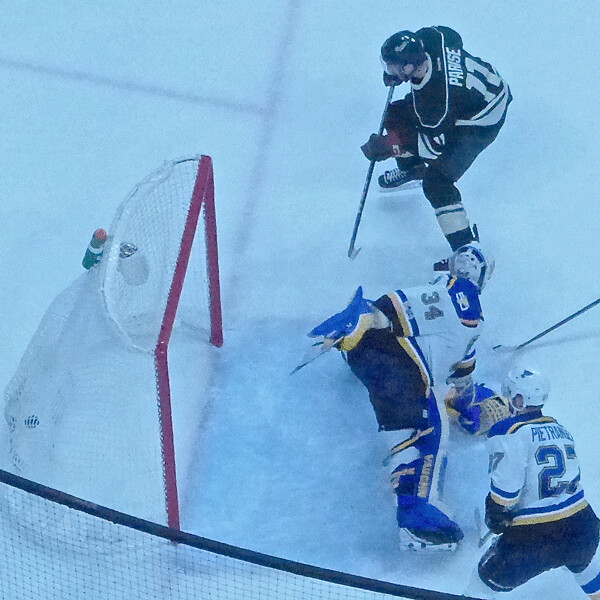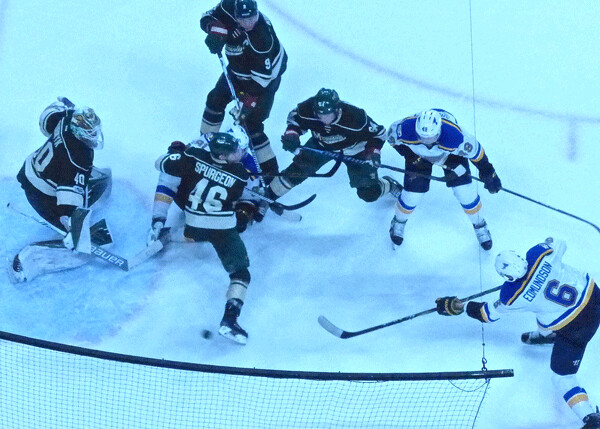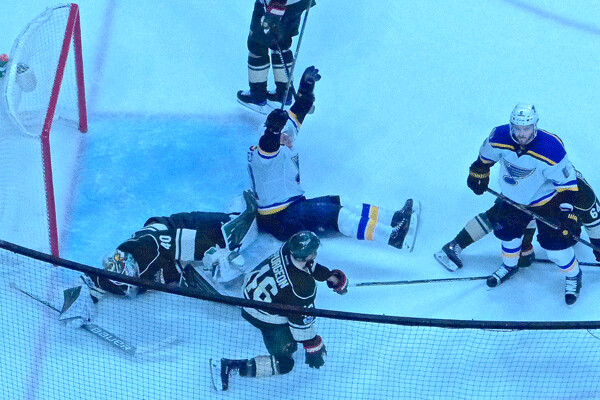News & Articles
Browse all content by date.

The Minnesota Wild faced a three-games-to-none deficit in their Stanley Cup Playoff series against the St. Louis Blues, which inspired mountains of complaints, protests, accusations and the kind of questions that could drive the effusive Bruce Boudreau away from the post-game podium. Many of the so-called analysts had not bothered to notice that the top-seeded Chicago Blackhawks were in exactly the same situation, having lost the first three games to the Nashville Predators.
The Wild’s Game 4 was Wednesday night in St. Louis; the Blackhawks on Thursday, as the top two teams in the Western Conference and the odds-on favorites to meet in next week’s Central Division finals both faced four-game eliminations.
You could say that parity has ruined the intensity of the National Football League, but it also is the greatest asset of the National Hockey League. The remarkable parity achieved by all 30 teams means the 16 teams paired up within conference playoffs are so close that nothing should be declared an upset, but more of a startling surprise just to make sure you’re paying attention.

After their best season in franchise history, the Wild faltered in the final month to let Chicago slip ahead for a 1-2 finish. Both were declared ready for a long playoff run, or at least one round before they would collide with each other in the division final.
But a couple of facts might have intruded on the good story angle: The Wild finished second in the Central Division with a 49-25-8 record for 106 points, 3 behind Chicago’s 50-23-9 mark. Third was St. Louis, at 46-29-7 for 99 points, while Nashville was fourth at 41-29-12. A couple of Twin Cities columnists have raved about the Wild being superior to St. Louis, and “clearly” having more talent. But second and third were hardly separated by anything remotely considered superiority.
Coach Mike Yeo, the former Wild coach, had gotten the Blues to play his disciplined defensive style, which he worked endlessly to install with the Wild, with some success. With the Blues, Vladimir Tarasenko is a free-flying superstar, but the rest of the Blues all adhere to Yeo’s defense-first system, making it extremely tough to fight to the net to prospect for rebounds.

The tightness of the Wild and Blues started in Game 1, at Xcel Center in St. Paul, and never left. The teams battled through a close-checking first period without scoring. Both teams have size and speed and skill, and both have eight European/Scandinavian players adding creativity to the lineup. Six minutes into the second period, Alexander Steen of the Blues picked off the puck from a Jonas Brodin outlet attempt on the right boards. Sensing that it might be just as tough to penetrate Minnesota’s slot, Steen zipped a pass farther out, just inside center-point, where Vladimir Sobotka was lurking all alone. Sobotka moved in, and fired a low screened shot that deflected up and in, over Devan Dubnyk’s glove to find the upper right corner of the net.
That was one of only six shots the Blues got in the second period, while the Wild got 16, but that large and rugged Blues defense — looking more like defensive linemen in football at 6-4, 6-3, 6-4, 6-6, 6-2, and 6-2, with three of them weighing between 220 and 226 pounds — made it easier for goaltender Jake Allen to look impenetrable.
That 1-0 lead stood through the third period, when the Wild fired 10 of the first 11 shots. In the final 1:11, after coach Bruce Boudreau pulled Dubnyk for a sixth attacker, the Wild resolutely attacked again and again. As the clock ticked down to its final 30 seconds, Ryan Suter fed from center point to Mikhail Granlund on the right boards; Granlund sent a perfect pass to the slot to Mikko Koivu; instead of shooting, Koivu made a 1-touch relay to the right edge of the net, where Zach Parise banged it past Allen with 22.7 seconds left, and the Wild had tied it 1-1. The Wild had outshot St. Louis 18-6 in the third period, and were about to make it 52-26 for the game, but all it was worth was a 1-1 tie.
In the 20-minute overtime, Suter was whistled for a slashing penalty that was a phantom, and then Alex Pietrangelo of the Blues got a makeup slashing call six minutes later. The Wild plan was to have Erik Haula play wing with Koivu and try to contain the mercurial Tarasenko, and for the most part he did well, twice stealing the puck for open breaks that were stopped. But with three minutes to go in overtime, Tarasenko got the puck deep in the right corner, with Koivu covering him. Tarasenko made a spectacular move, with a deke one way and then the other, and spun free of Koivu to break for the goal.
The Wild defense, already gathered, stiffened, and Tarasenko had no path, so he flipped the puck ahead and crashed through the bodies. Dubnyk moved to block whatever might be coming, but the puck continued through the tangle, and Joel Edmundson, a comparatively unknown defenseman who had moved in recklessly far from left point, snapped the puck into the left side of the open net.
At 17:48 of sudden-death overtime, the 19,168 fans went limp. Tarasenko sitting sprawled at the crease exulted from there, and Edmundson just sort of stood there as though he had never scored enough goals to know how to celebrate. But the Blues had a stunning 2-1 victory.
In Game 2, back at Xcel, we all knew the Wild had to “play better,” but just as Yeo had promised, the Blues also knew they had to improve their game. They did, and the Blues again escaped with a much closer 2-1 victory. Edmundson, of all people, broke the scoreless tie early in the second period, then Parise scored on a 2-man power play. At 1-1, former Colorado College star Jaden Schwartz shot past a screening teammate to beat Dubnyk. Maybe there could have been time for another desperate comeback, but only 2:27 remained when it got to 2-1, and Allen held on for the 2-0 headstart. Meanwhile, in Chicago, the Blackhawks were also down 2-0 and hadn’t scored a single goal.
Off to St. Louis, the Wild fell behind 1-0 in the first period, but Charlie Coyle tied it midway through the second before a questionable call gave the Blues a power play immediately after that tying goal. Ryan White was sent off for high-sticking Schwartz in the face, an automatic call, except that replays showed center Martin Hanzel was following through after a faceoff when Schwartz skated into Hanzel’s face, which is not an automatic penalty.
On the power play, Steen tried a wraparound and Schwartz knocked in the rebound for a 2-1 lead for the third straight game, and it remained until Steen fired the puck into an empty net with 1:11 left, giving the Blues a 3-1 margin.
The raves and the accusations flowed in the Twin Cities after that, but in reality, the rigid Blues defense taking a 3-0 hold on the series was a surprise, but not the biggest NHL surprise. The mighty Chicago Blackhawks, with all their firepower, got shut out 1-0 by Pekka Rinne and the Nashville Predators, then the Blackhawks collapsed in Game 2 and lost 5-0 to Rinne. The No. 1 Blackhawks and No. 4 Predators headed for Nashville for Game 3, where Chicago took a 2-0 lead in the second period. But Filip Forsberg scored twice in the third period to tie the game for Nashville, and Kevin Fiala won it 3-2 for the Predators in overtime, outshooting Chicago 52-38 in the process. That was one of four Stanley Cup games Monday night, and all four of them went to overtime.
The two Central Division rivals and Western Conference favorites, however, both faced 0-3 risks of elimination at midweek, by two teams the majority of the media has long-since declared as “inferior.” At this time of year, there is no such thing as an inferior team, just 16 teams playing their best, and going for the Cup. That’s why we love the National Hockey League.
| Tweet |


